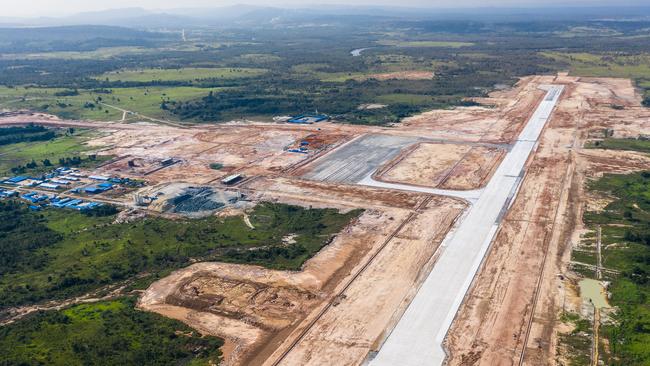China strikes Cambodian base deal
China has signed a secret agreement allowing its armed forces to use a Cambodian navy base near Sihanoukville.

China has signed a secret agreement allowing its armed forces to use a Cambodian navy base near Sihanoukville, as Beijing works to boost its ability to project military power around the globe, according to US and allied officials familiar with the matter.
The pact — signed this year but not disclosed by either side — gives China exclusive rights to part of a Cambodian naval installation on the Gulf of Thailand, not far from a large airport being built by a Chinese company.
Some details of the final deal were unclear, but an early draft, seen by US officials, would allow China to use the base for 30 years, with automatic renewals every 10 years after that. China would be able to post military personnel, store weapons and berth warships, according to the draft.
Military operations from the naval base, airport, or both, would sharply increase Beijing’s capacity to enforce territorial claims and economic interests in the South China Sea, to threaten US allies in Southeast Asia and to extend its influence over the strategically important Malacca Strait.
Chinese and Cambodian officials have denied there are any plans for a Chinese military base in the country. “Nothing is happening like that,” Phay Siphan, a Cambodian government spokesman, said on Saturday. He called it “fake news”. US and allied officials, however, said a deal had been done that, while stopping short of a full-scale Chinese base, would give Beijing its first dedicated naval staging facility in Southeast Asia and a second outpost in what the Pentagon sees as a Chinese quest for a global network of military sites.
Washington is “concerned that any steps by the Cambodian government to invite a foreign military presence in Cambodia” would disturb regional peace and stability, said Emily Zeeberg, a spokeswoman for the US embassy in Phnom Penh.
The naval installation in question, at Ream, covers about 75ha and includes two facilities built with US funding and used by the Cambodian navy, and a single pier where a dozen patrol craft dock.
According to the early draft of the accord, China would build two new piers — one for Chinese use, one for Cambodian. US officials said further dredging would likely be needed for the base to host larger Chinese navy ships.
The draft also allows China’s personnel to carry weapons and Cambodian passports and requires Cambodians to get Chinese permission to enter the 25ha Chinese section of Ream.
Sihanoukville has attracted large numbers of Chinese tourists, and millions of dollars of investment, mostly going into casinos and beachfront hotels.
The US-funded facilities at Ream are to be moved to allow “further infrastructure development and security enhancement”, according to a letter this month from Cambodia’s Defence Ministry to the US.
US officials are debating whether Washington can persuade Phnom Penh to reverse its decision. A senior Pentagon official said the US wanted Cambodia to be a “preferred security partner”, but other officials said it appeared Phnom Penh had turned toward Beijing.
US and allied counterparts are also lobbying Cambodia not to allow China’s military to use the large new airport being built at Dara Sakor, about 70km northwest of Ream, by a private Chinese company with a 99-year lease.
Satellite images show that work has progressed rapidly in the past year. The site now features a 3km-long runway — big enough for Boeing 747s and Airbus A380s, and for China’s long-range bombers and military transports.
The images, according to US and allied officials, also show what appear to be preparations for the runway turns needed for quick takeoffs and landings by military aircraft, particularly fighters. The company building the airport has said it is purely commercial.
Warplanes flying from Dara Sakor would be able to strike targets in Thailand, Vietnam and Singapore.
China opened its first military outpost abroad, in the east African nation of Djibouti, in 2017, to facilitate operations around the Indian Ocean and Africa. Since 2014, China has also built seven heavily fortified artificial islands — three with airstrips — in the South China Sea. A Cambodian outpost would further cement China’s grip on a country whose authoritarian government is backed by Chinese loans, investment and diplomatic clout, as Beijing increasingly challenges Washington for economic and military influence across the developing world.
The Wall Street Journal


